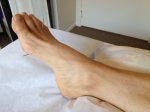Chinese Herbs and Acupuncture for Asthma
Traditional Chinese doctors have employed herbal medicine and acupuncture for asthma treatment for centuries. The theory and practice of asthma treatment differs from Western medicine.
Modern medical theory describes asthma as a predisposition to chronic pulmonary inflammation which involves intermittent, reversible constriction of the airways (bronchi).
Asthmatic attacks involve constriction of the smooth muscle cells in the bronchi, inflammation and swelling of the bronchi, and difficult breathing. The person experiences this as a tight chest. Airborne or food allergies often underlie this condition.
According to Chinese medical theory, this condition has two possible primary causes, both of which could occur in a single individual: 1) pulmonary inflammation, or "lung heat," arising from infection or allergy, or 2) a constitutional weakness of adrenal and pulmonary function.
Acupuncture for Asthma
Modern research on acupuncture treatment of this condition has produced conflicting results. However, in my practice I frequently find that people who have asthma breath much easier after an acupuncture treatment. It appears that the experience of asthma itself causes people to get tense in their chest and diaphragm, which increases the difficulty of breathing. Acupuncture produces relaxation of the chest and diaphragm, resulting in easier breathing.
Chinese Herbal Medicine for Asthma
Dr. Xiu-Min Li, M.D., of the Department of Pediatrics, Mount Sinai School of Medicine, New York, New York, published a review of Traditional Chinese herbal remedies for Asthma and Food Allergy [full text] in the Journal of Allergy and Clinical Immunology. He reported "Controlled clinical trials with anti-asthma TCM formulas such as ASHMI [anti-asthma herbal medicine intervention], mMMDT [modified Mai Men Dong Tang, a classic formula), and DCT {Ding Chuan Tang, another classic formula], etc., highlight the potential of TCM formulas to be efficacious and safe alternatives or complements to standard western therapy for asthma. FAHF-2 [Food Allergy Herbal Formula #2], a potential TCM herbal treatment for food allergy, was shown to be remarkably effective against food anaphylaxis in an animal model with the potential to be a long-lasting therapy."
In Efficacy and mechanisms of action of traditional Chinese medicines for treating asthma and allergy Dr. Li reviewed studies on herbal medicine treatment of this condition and found that herbal medicines may act by exerting anti-inflammatory action, inhibiting airway smooth muscle contraction, and modulating immune response.
Food Choices and Asthma
A whole foods plant based diet is beneficial for asthma.
In 2020 Alwarith and colleagues reviewed evidence for the role of nutrition in the prevention and treatment of asthma and reported:
"Evidence suggests that diets emphasizing the consumption of plant-based foods might protect against asthma development and improve asthma symptoms through their effects on systemic inflammation, oxidation, and microbial composition. Additionally, increased fruit and vegetable intake, reduced animal product consumption, and weight management might mediate cytokine release, free radical damage, and immune responses involved in the development and course of asthma." [Bold added]
Now seeing clients in person at:
The Retreat, LLC
7118 Summerfield Rd
Lambertville, MI 48144
Call To Make Appointment:
602-954-8016
Telemedicine:
602-954-8016
Acupuncture Toledo OH
Acupuncture Monroe MI
Recent Articles
-
Whole Foods Plant-Based Diet
Oct 02, 23 07:02 PM
Heal yourself with a whole foods plant-based diet. -
Acupuncture and Chinese Medicine | Lambertville MI, Toledo OH
Oct 02, 23 01:43 PM
Affordable acupuncture and Chinese medicine. Try Barefoot Acupuncture Clinic in Lamberville, MI. -
Regular acupuncture benefits rheumatoid arthritis patients.
Oct 31, 19 02:17 PM
A 2018 study published in Evidence Based Complementary and Alternative Medicine Journal found that clinical trials indicate that regular acupuncture over at least 3-12 weeks improves condition and qua… -
Acupuncture and herbal medicine reduce ringing in ears
Oct 30, 19 02:17 PM
"Acupuncture provides tinnitus relief. Luoding City Hospital of Traditional Chinese Medicine (Guangdong, China) researchers determined that acupuncture combined with the herbal formula Liu Wei Di Huan… -
Origin of "Barefoot Acupuncture"
Sep 28, 19 02:24 PM
Origin of "barefoot acupuncture" for our clinic name. -
Complementary facial rejuvenation session.
Sep 28, 19 01:35 PM
During the month of October 2019, receive a complementary facial rejuvenation treatment ($35 value) with any new patient or follow-up acupuncture treatment! Use this code to claim your free facial rej… -
Acupuncture as an alternative to opioids.
Sep 28, 19 01:29 PM
Conventional medical professionals have a growing interest in use of acupuncture instead of opioids for chronic pain. -
Acupuncture a 'Realistic Option' vs HRT for Hot Flashes
Apr 10, 19 01:50 PM
I have had many patients report less hot flashes with regular acupuncture. We also have Chinese herbal formulas that are very effective for controlling menopausal hot flashes and night sweats. Medscap… -
Chinese Herbal Medicine
Oct 31, 18 01:26 PM
Quality Chinese herbal medicine can help resolve a wide variety of conditions. -
Perception of Therapeutic Qi, a Nonmechanical, Nonpsychological Factor in Acupuncture That Originates from the Therapist
Oct 18, 18 05:00 PM
An interesting study indicates that people who have experience receiving acupuncture can distinguish between purely mechanical needling (no human contact with the needle) and human contact with the ne…

